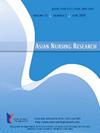An Evaluation Index System to Assess Nurse Competency in Enhanced Recovery After Surgery Programs: A Delphi Study
IF 2.1
3区 医学
Q2 NURSING
引用次数: 0
Abstract
Purpose
To construct an index system to evaluate the competencies of nurses in enhanced recovery after surgery (ERAS) programs and provide a scientific foundation for their training and assessment.
Methods
Utilizing a literature review and semi-structured interviews, a preliminary indicator system was constructed. Based on the preliminary indicator system, a Delphi questionnaire was developed and utilized to achieve consensus among experts in two rounds of Delphi studies. The indicators were selected based on a mean importance score greater than 4 and a coefficient of variation less than .25. The weights of the indicators were calculated using the Analytic Hierarchy Process.
Results
The study developed a system that evaluates the competencies of nurses involved in ERAS programs, offering a reference for their training and evaluation. The final index system includes 7 primary indicators, 20 secondary indicators, and 66 tertiary indicators. The primary indicators consist of competencies in the following components: 1) Direct clinical practice (20 items); 2) Expert coaching and guidance (9 items); 3) Consultation (6 items); 4) Research (7 items); 5) Leadership (11 items); 6) Collaboration (8 items); and 7) Ethical decision-making (5 items).
Conclusion
The developed competency evaluation index system is reliable and can serve as a foundation for the selection, training, and assessment of ERAS nurses.
评估术后恢复强化项目中护士能力的评价指标体系:德尔菲研究。
目的:构建一套指标体系来评估护士在术后恢复强化项目中的能力,为其培训和评估提供科学依据:方法:利用文献综述和半结构式访谈,构建初步指标体系。在初步指标体系的基础上,制定了德尔菲调查问卷,并通过两轮德尔菲研究在专家之间达成共识。指标的选择以平均重要度大于 4 分和变异系数小于 0.25 为基础。指标权重采用层次分析法计算:研究开发了一套系统,用于评估参与 ERAS 计划的护士的能力,为其培训和评估提供参考。最终的指标体系包括 7 个一级指标、20 个二级指标和 66 个三级指标。一级指标包括以下几个方面的能力:1) 直接临床实践(20 项);2) 专家辅导和指导(9 项);3) 咨询(6 项);4) 研究(7 项);5) 领导(11 项);6) 协作(8 项);7) 道德决策(5 项):所开发的能力评价指标体系是可靠的,可作为 ERAS 护士选拔、培训和评估的基础。
本文章由计算机程序翻译,如有差异,请以英文原文为准。
求助全文
约1分钟内获得全文
求助全文
来源期刊

Asian Nursing Research
NURSING-
CiteScore
4.20
自引率
4.50%
发文量
32
审稿时长
45 days
期刊介绍:
Asian Nursing Research is the official peer-reviewed research journal of the Korean Society of Nursing Science, and is devoted to publication of a wide range of research that will contribute to the body of nursing science and inform the practice of nursing, nursing education, administration, and history, on health issues relevant to nursing, and on the testing of research findings in practice.
 求助内容:
求助内容: 应助结果提醒方式:
应助结果提醒方式:


